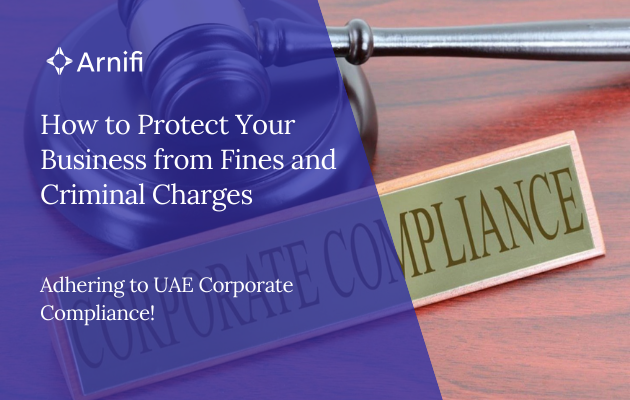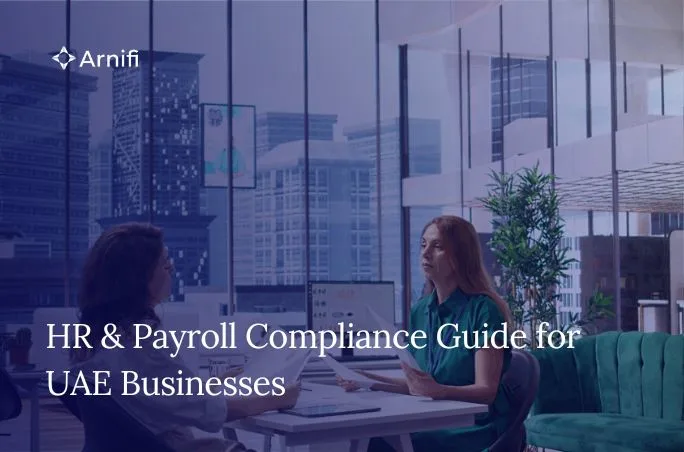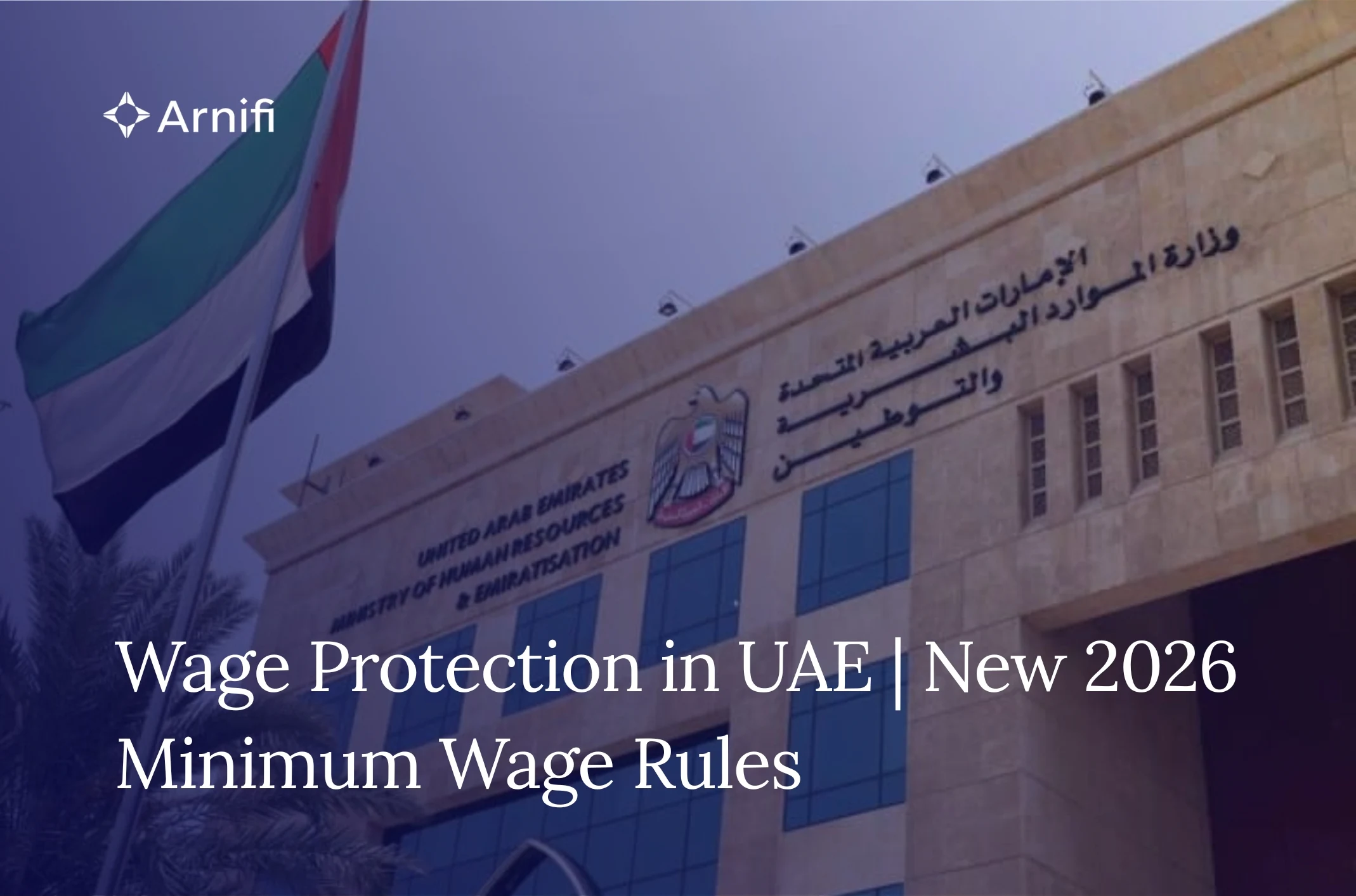Adhering to UAE Corporate Compliance | To Avoid Fines and Criminal Charges
by Shethana May 14, 2025  6 MIN READ
6 MIN READ

Introduction
Within the UAE, the business centers have grown with remarkable rapidity, drawing in entrepreneurs and investors from across the globe. With its positioning, investor-friendly scenario, and autonomy to choose between free zones and mainland jurisdictions, the nation presents the business communities with phenomenal opportunities. These opportunities come with severe corporate compliance obligations.
Adhering to and understanding corporate compliance laws in the UAE is not a matter of check-the-box exercises; this is a legal obligation that would draw severe penalties if neglected, including huge fines and even criminal liability. However, expectations can significantly differ whether you operate in a free zone or on the mainland.
We aim to shed light upon some of the most crucial compliance issues under the UAE legal landscape- Economic Substance Regulations, UBO regulations, VAT, AML, and other key obligations. If you are doing business or thinking of setting up a business in the UAE, consider it your legal compliance survival kit.
Compliance Audit Requirements
Mainland Compliance
In the mainland, firms come under stringent regulatory control from bodies like the Department of Economic Development (DED) and the Ministry of Economy. These businesses have to prepare annual-level financial audits by a certified auditor. These reports help to renew their business licenses and demonstrate transparency.
Freezone Compliance
Although Freezones tend to give a little more leverage and incentives, they still require companies to file annual audit reports with the respective Freezone authority.
A few Freezones are more stringent than others—for instance, DMCC, JAFZA, and DIFC have very defined compliance and audit procedures. Companies must ascertain that the auditor they engage is recognized by the respected Freezone authority.
Non-compliance in either domain may result in the suspension of licenses, major penalties, and damages to the standing of the company.
What is ESR (Economic Substance Regulations)?
Released in 2019, the ESR provides that companies carrying on certain “Relevant Activities” in the UAE have sufficient economic presence. Some of the included activities are banking, insurance, fund management, lease-finance, shipping, and holding company business, amongst others.
- Submit a notification to the Ministry of Finance.
- File an annual Economic Substance Report.
- Demonstrate core income-generating activities (CIGA) conducted in the UAE.
- Show adequate employees, premises, and expenditure in the country.
If the business owner fails to comply with ESR, penalties starting from AED 10,000 to AED 300,000 are imposed against the owner.
Ultimate Beneficial Owner (UBO) Regulations
UBO legislation was established to make company ownership more transparent. All UAE companies (other than government-owned companies listed on a regulated stock exchange) are required to disclose their UBO, i.e., the person(s) who ultimately own or control the business.
- Some of the most important requirements are:
- Keeping a UBO register.
- Informing the concerned authority about variations within 15 days.
Non-compliance will incur fines of up to AED 100,000 and other administrative measures like suspension of licenses.
VAT (Value-Added Tax)
Introduced in 2018, VAT is mandatory for businesses whose taxable supplies exceed AED 375,000 annually. Compliance involves:
- Timely VAT registration and filing.
- Issuing VAT-compliant invoices.
- Keeping proper accounting records.
Missing VAT filings or making incorrect declarations can attract penalties ranging from AED 1,000 for late submissions to AED 50,000 for tax evasion.
What is the AML (Anti-Money Laundering) Regulations in the UAE?
The UAE, being a hub with several illicit financial activities, has strict AML regulations. The central laws include Federal Decree-Law No. (20) of 2018 and Cabinet Decision No. (10) of 2019. Additionally, as per the provisions, the rules apply to financial institutions and DNFBPS such as real estate brokers, auditors, precious metals and stones dealers, etc.
The following are some of the duties that businesses must undertake:
- Customer Due Diligence (CDD): Identify the true identity of the customer and assess the nature of the business relationship.
- Suspicious Transaction Report (STR): Report suspicious transactions to the FIU of the UAE.
- Record Keeping: Retention of client records for a period of five years.
Above all if anyone violates AML policies, a fine of up to AED 5 million or more and be brought to criminal prosecution in case such violations occur, and responsible executives will be charged.
What is Country-by-Country Reporting (CbCR)?
CbCR applies to UAE-headquartered multinational groups with AED 3.15 billion or more consolidated revenues in the previous financial year. The objective is to obtain tax transparency and make sure profits are taxed where economic activities occur.
Compliance requirements of key importance:
- Submission of the CbCR notification within the close of the financial year.
- Submission of the CbCR report within 12 months of the fiscal year end.
- Disobedience is punishable by a fine between AED 250,000 and AED 1,000,000 and a one-day fine per repetitive offence.
Wage Protection System (WPS)
The UAE Central Bank and the Ministry of Human Resources and Emiratisation (MOHRE) developed WPS as a mandatory electronic wage transfer system. It ensures timely and full payment of agreed wages to workers. Key points:
- All employers must register with WPS.
- Salaries must be paid through UAE-approved banks.
Failure to comply can result in:
- Suspension of work permits.
- Fines of AED 1,000 to AED 50,000 per offence.
- Blacklisting from government contracts.
Check What Arnifi’s HR Solutions Offer
Arnifi HR solutions simplify the recruitment process in the UAE as all is completely compliant with labour laws, visas, WPS, and insurance, thus avoiding legal risks.You don’t need to set up a local entity, which saves both time and cost. Efficient and speedy onboarding allows your team to start work in a matter of days.
From simple to premium, our adaptable plans fit the requirements and budgets of various companies. And with the totally open pricing, you will never have to fret about surprise fees. For stress-free, compliant, efficient, and cost-effective hiring in the UAE, there is no need to look any further than Arnifi HR. For better comprehension, get a free consultation today!
Conclusion
Compliance in UAE is not a one-time affair—it’s an ongoing process. From ESR and UBO to VAT, AML, CbCR, and WPS, each of these regulations serves a particular purpose in maintaining the economic integrity and global reputation of the nation. However, most of the Entrepreneurs and business owners who understand and integrate these regulations into their processes not only avoid penalties but also create a solid foundation for long-term growth.
Ignoring compliance is not just a danger to the law—it’s dangerous for business. Act now and stay vigilant, stay prepared, and stay protected.
Top UAE Packages

Related Articles
Top UAE Packages



